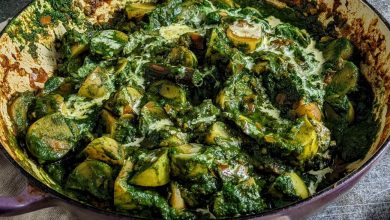Karuveppilai Kuzhambu Recipe (Tangy & Spicy Curry Leaves Curry)
The Karuveppilai Kuzhambu, also known as the Curry Leaves Curry, is a delightful and tangy South Indian dish that is beloved for its vibrant flavors and aromatic appeal. This classic recipe features curry leaves, also known as Karuveppilai, which are finely ground along with a mix of roasted spices and fresh coconut to create a unique masala. This masala is then added to a tangy and spicy tamarind water base, which, when combined with the sweetness of jaggery and the sharpness of pearl onions, creates a delicious balance of flavors. The aromatic seasoning, consisting of curry leaves, mustard seeds, and urad dal, completes the dish, making it a must-try for anyone who enjoys traditional South Indian cuisine.
Ingredients
| Ingredients for Roasting & Grinding | Quantity |
|---|---|
| Curry leaves | 50 grams |
| Methi Seeds (Fenugreek Seeds) | 1 teaspoon |
| White Urad Dal (Split) | 1 teaspoon |
| Coriander (Dhania) Seeds | 1 tablespoon |
| Dry Red Chillies | 3 |
| Fresh coconut (grated) | 2 tablespoons |
| Ingredients for Kuzhambu | Quantity |
|---|---|
| Tamarind Water | 1 cup |
| Pearl onions (Sambar onions), quartered | 12 |
| Turmeric powder (Haldi) | 1 teaspoon |
| Jaggery | 1 tablespoon |
| Salt | To taste |
| Ingredients for Seasoning | Quantity |
|---|---|
| Sesame (Gingelly) Oil | 1 teaspoon |
| Curry leaves | 1 sprig |
| Mustard seeds (Rai/Kadugu) | 1 teaspoon |
| White Urad Dal (Split) | 1 teaspoon |
Preparation Time: 10 minutes
Cooking Time: 40 minutes
Total Time: 50 minutes
Instructions
Step 1: Prepare the Ground Masala
- Begin by preparing the masala paste. Heat a skillet on medium heat and add the methi seeds, white urad dal, dry red chillies, and coriander seeds.
- Roast the spices for a few minutes, stirring occasionally, until they turn golden and release their fragrant aroma. Once they are lightly browned, remove the skillet from heat.
- Transfer the roasted ingredients into a mixer grinder. Add the grated fresh coconut and fresh curry leaves. Grind everything into a coarse yet smooth paste. You may add a little water if necessary to facilitate the grinding. Set this masala paste aside.
Step 2: Prepare the Kuzhambu Base
- In a large saucepan, heat one teaspoon of sesame oil over medium heat. Add the quartered pearl onions and sauté them until they turn lightly golden and emit a sweet aroma. This should take around 4 to 5 minutes.
- Once the onions are cooked, pour in the tamarind water, followed by turmeric powder and salt. Allow the mixture to come to a brisk boil for 4 to 5 minutes.
- After boiling, add the Karuveppilai masala into the simmering onion-tamarind mixture. Stir well to combine all the ingredients. Taste the mixture and adjust the salt and spices as per your preference.
Step 3: Simmer the Kuzhambu
- Reduce the heat and let the Karuveppilai Kuzhambu simmer for about 3 to 4 minutes to allow the flavors to blend beautifully. Once done, turn off the heat and transfer the curry into a serving bowl.
Step 4: Prepare the Seasoning
- For the seasoning, heat a small tadka pan on medium heat. Add mustard seeds and white urad dal, allowing them to crackle and lightly roast until golden.
- Add the curry leaves and turn off the heat. Pour this flavorful seasoning over the Kuzhambu to enhance the taste.
Serving Suggestions
Karuveppilai Kuzhambu is best served warm with steamed rice. Pair it with crispy Potato Roast for a traditional South Indian lunch. It’s perfect for a weekend family gathering or any time you crave a delicious, tangy, and spicy curry.
Dietary Information
- Diet: Vegetarian
- Allergens: Contains coconut, mustard seeds, and urad dal (Split), which may be allergens for some individuals.
- Nutritional Information (approx. per serving):
- Calories: 90
- Protein: 2g
- Carbohydrates: 18g
- Fat: 2g
- Fiber: 3g
- Sodium: 250mg
Dietary Preferences
This dish is naturally vegetarian and is suitable for most diets. It’s also gluten-free, dairy-free, and a great option for vegan diets, provided the jaggery used is confirmed to be vegan. The use of sesame oil enhances the traditional flavor, making it an ideal choice for those seeking an authentic South Indian meal.
Advice
For an extra depth of flavor, you can experiment with the amount of jaggery depending on how sweet or tangy you prefer your Kuzhambu. You can also adjust the spiciness by varying the number of red chillies used in the masala. This dish can be made ahead of time and stored in the fridge for up to 2 days, making it a perfect option for meal prepping. Simply reheat before serving with fresh rice.
Conclusion
The Karuveppilai Kuzhambu is a wonderful combination of spicy, tangy, and earthy flavors that embody the essence of South Indian cuisine. With its fragrant spices, fresh curry leaves, and a sweet touch from the jaggery, this curry is sure to become a favorite in your home. Whether you are a South Indian cuisine enthusiast or someone looking to explore more vegetarian curry options, this Karuveppilai Kuzhambu is an absolute delight to savor.





